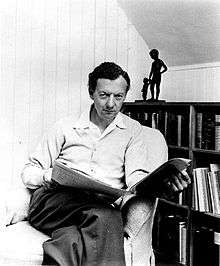The Prodigal Son (Britten)
The Prodigal Son is an opera by Benjamin Britten with a libretto by William Plomer. Based on the Biblical story of the Prodigal Son, this was Britten's third "parable for church performance", after Curlew River and The Burning Fiery Furnace. Britten dedicated the score to Dmitri Shostakovich.
| The Prodigal Son | |
|---|---|
| Opera by Benjamin Britten | |
 The composer in 1968 | |
| Description | A Parable for Church Performance |
| Librettist | William Plomer |
| Based on | Prodigal Son |
| Premiere | |
The first performance took place on 10 June 1968 in St Bartholomew's Church, Orford, Suffolk.[1] The instrumentalists included the horn player Neill Sanders and the percussionist James Blades. Colin Graham was the stage director.[2] The United States premiere was presented at the Caramoor Summer Music Festival on 29 June 1969 with Andrea Velis as the Tempter/Abbot.[3]
As with the other church parables, the instrumental forces are very modest: flute, horn, viola, double bass, harp, organ and percussion, with the use of the alto flute and small trumpet in D marking changes compared to the other works. The percussion also incorporates a gourd rattle.[4]
Roles
| Role | Voice type | Premiere Cast, 10 June 1968 (Conductor: Benjamin Britten) |
|---|---|---|
| Tempter/Abbot | tenor | Peter Pears |
| The Father | bass baritone | John Shirley-Quirk |
| The Younger Son | tenor | Robert Tear |
| The Elder Son | baritone | Bryan Drake[5] |
| Young Servants and Distant Voices | Gerald Beauchamp, Michael Butler, Jonathan Fox, Richard Hopkins, David Rookwood | |
| Chorus: Servants, Parasites,and Beggars | ||
Synopsis
The story centers on a farm family, which consists of a father and his two sons. Servants also help with working the land. The elder son and the servants leave to work the fields for the day. The younger son hears a voice that tempts him to indulge his "most secret longings". The younger son asks his father for his inheritance, which the father grants. The younger son makes his way to the city. There, he is deprived of his fortune and left penniless. The younger son then returns home and asks his father's forgiveness. His father receives his younger son with rejoicing, but the elder son is initially angry at his father's reaction, after he himself has loyally worked the fields. The father rebukes his elder son, and asks him to be reconciled to his younger brother, who has returned to restore the family.
Recordings
Britten and Viola Tunnard directed the first recording of the work, for the Decca label (original listing, Decca SET 438) with the premiere's cast and players.[6] The full cast of singers is:
- Tempter/Abbot: Peter Pears
- The Father: John Shirley-Quirk
- The Younger Son: Robert Tear
- The Elder Son: Bryan Drake
- Chorus of Servants, Parasites and Beggars: Paschal Allen, Carl Duggan, David Hartley, Philip Hooper, Peter Leeming, John McKenzie, Clive Molloy, Paul Wade
- Young Servants and Distant Voices: Gerald Beauchamp, Michael Butler, Jonathan Fox, Richard Hopkins, David Rookwood
References
Notes
- Matthews, David (Summer 1968). "Britten's The Prodigal Son". Tempo (85): 28–30. JSTOR 943764.
- Alan Blyth (2007-04-10). "Colin Graham". The Guardian. Retrieved 2017-03-12.
- Donal Henahan (October 14, 1966). "Britten Parable Makes U.S. Debut; ' Prodigal Son' Is Conducted by Rudel at Caramoor". The New York Times. p. 34.
- Thomas, Christopher J. (1986). "The Church Parables". The Opera Quarterly. 4 (3): 178–184. doi:10.1093/oq/4.3.178. Retrieved 2008-05-01.
- Keith Grant (2002-04-08). "Bryan Drake". The Guardian. Retrieved 2017-03-12.
- Howard, Patricia (September 1970). "Review of recording of Britten's The Prodigal Son". Tempo. 111 (1531): 899, 901. JSTOR 943764.
Sources
- Holden, Amanda (Ed.), Viking Opera Guide ed. Holden (Viking, 1993)